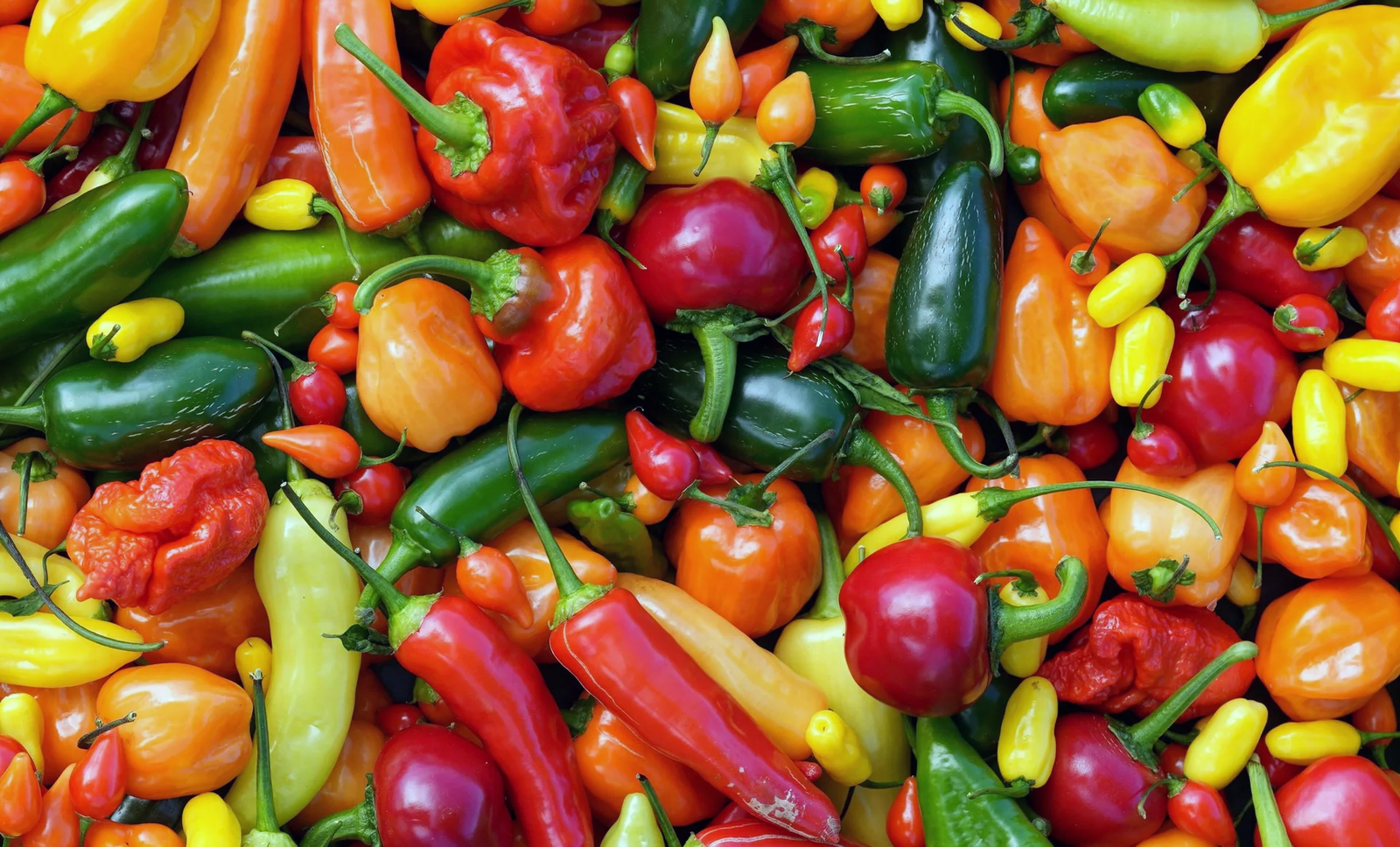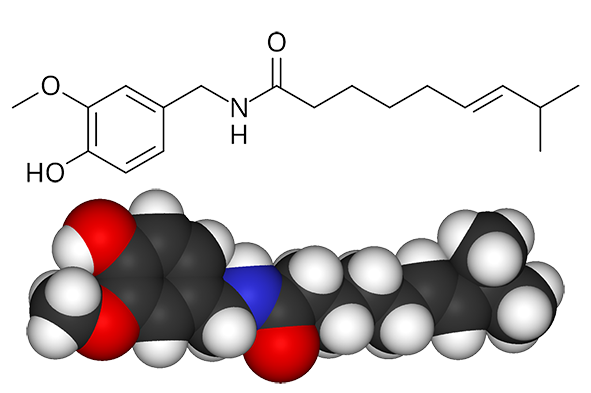FabulousFusionFood's Chilli-based Recipes 11th Page
 A mixture of different chilli peppers.
A mixture of different chilli peppers.
Welcome to FabulousFusionFood's Chilli-based Recipes Page — The recipes presented here all contain chilli peppers as a main ingredient. Chillies are the fruit of the chilli plant. Along with black pepper, they are unique spices in that they impart 'heat' to a dish without any associated bitterness. The dried and powdered fruit along with the fresh fruit and the dried fruit are all used as spices. As well as their capsaicin induced heat, chillies (depending on the variety or cultivar) can also imbue a dish with a fruity flavour. Smoked chillies are also used to impart a smokiness as well as heat to a dish.
Chilli peppers, also spelled chile or chili (from Classical Nahuatl chīlli [ˈt͡ʃiːlːi]) and known as hot peppers, are varieties of berry-fruit plants from the genus Capsicum, which are members of the nightshade family Solanaceae, cultivated for their pungency. Chilli peppers are widely used in many cuisines as a spice to add "heat" to dishes. Capsaicin and the related capsaicinoids give chillies their intensity when ingested or applied topically. Chilli peppers exhibit a range of heat and flavours. This diversity is the reason behind the availability of different types of chilli powder, each offering its own taste and heat level.
Chilli peppers originated in Central or South America and were first cultivated in Mexico. European explorers brought chillies back to the Old World in the late 16th century as part of the Columbian Exchange, which led to the cultivation of multiple varieties across the world for food and traditional medicine. Five Capsicum species have been widely cultivated: annuum, baccatum, chinense, frutescens, and pubescens.
 The capsaicin molecule, chemical structure (top) and space-filling model (bottom).
The capsaicin molecule, chemical structure (top) and space-filling model (bottom).
When peppers are consumed by mammals such as humans, capsaicin binds with pain receptors in the mouth and throat, potentially evoking pain via spinal relays to the brainstem and thalamus where heat and discomfort are perceived. However, birds are unable to perceive the hotness and so they can eat some of the hottest peppers. The intensity of the "heat" of chillies is commonly reported in Scoville heat units (SHU), invented by American pharmacist Wilbur Scoville in 1912. Historically, it was a measure of the dilution of an amount of chilli extract added to sugar syrup before its heat becomes undetectable to a panel of tasters; the more it has to be diluted to be undetectable, the more powerful the variety, and therefore the higher the rating. Since the 1980s, spice heat has been assessed quantitatively by high-performance liquid chromatography (HPLC), which measures the concentration of heat-producing capsaicinoids, typically with capsaicin content as the main measure
The alphabetical list of all the chilli-based on this site follows, (limited to 100 recipes per page). There are 1306 recipes in total:
Page 11 of 14
| Restaurant Tandoori Marinade Origin: India | Saka saka (Congolese Cassava Leaves) Origin: Congo | Sauce de Tomates Crues (Raw Tomato Sauce) Origin: Benin |
| Restaurant-style Chakalaka Origin: South Africa | Saka-saka (Mutton and Cassava Leaf Stew) Origin: Guinea | Sauce Gbanbouda (Tô with Okra Sauce and Peanuts) Origin: Guinea |
| Restaurant-style Dum Aloo Origin: India | Sakay Origin: Madagascar | Sauce Gombo (Gombo Sauce) Origin: Guinea |
| Restaurant-style Madras Curry Origin: Britain | Salade Chou Chou (Chako Salad) Origin: Mauritius | Sauce Gombo et Boeuf (Okra Sauce with Beef) Origin: Burkina Faso |
| Rhubarb and Common Hogweed Seed Chutney Origin: Britain | Salade de Zaalouk (Salad of Cooked Vegetables) Origin: Tunisia | Sauce Gombo Togolaise (Togolese Okra Sauce) Origin: Togo |
| Rice and Peas Origin: Jamaica | Salata Aswad (Sudanese Aubergine Salad) Origin: Sudan | Sauce Gombos Burkinabé (Burkinabe Okra Sauce) Origin: Burkina Faso |
| Rice with Pigeon Peas Origin: Puerto Rico | Salata Méchouia Nablia (Grilled Red Pepper, Chilli and Tomato Salad) Origin: Tunisia | Sauce Légume Origin: Benin |
| Ris Gras Burkinabé Origin: Burkina Faso | Salmi Poulet Mauriticien (Chicken Mauritius) Origin: Mauritius | Sauce piquante créole (Creole Hot Sauce) Origin: Guadeloupe |
| Riz au Gras ('Fat Rice') Origin: Benin | Salmon Kalia in Panch Phoron Sauce Origin: India | Sauci Yohss (Gambian Mussel Meats in Tomato Sauce with Potatoes) Origin: Gambia |
| Riz et Pois Collés (Haitian Rice with Peas) Origin: Haiti | Salmon with Acacia Seed and Tasmanian Pepper Berry Rub Origin: Australia | Scallop and Prawn Chu Chee Origin: Thailand |
| Riz Wolof (Wolof Rice) Origin: Guinea | Salsa con Queso Jalapeña (Nicaraguan Cream Sauce with Cheese) Origin: Nicaragua | Scotch Bonnet Hot Sauce Origin: Jamaica |
| Roadhouse Chili Pizza Origin: American | Salsa de Abacate de Guineano (Equatorial Guinean Avocado Salsa) Origin: Equatorial Guinea | Seafood Chili Origin: American |
| Roast Chicken Noodle Soup with Chopsuey Greens Origin: Fusion | Salsa de Chile Rojo (Red Chilli Sauce) Origin: Spain | Seaweed Vinegar Origin: Canada |
| Roast Tomato Bharta Origin: Anglo-Indian | Salsa Jalapeña (Nicaraguan Cream Sauce) Origin: Nicaragua | Seengre ke Satha Tori Kari (Courgette Curry with Radish Pods) Origin: India |
| Rocoto Rellenos (Stuffed Rocoto Chillies) Origin: Peru | Salt Cod Fish Cakes Origin: Bahamas | Seitan Nyembwe Origin: African Fusion |
| Romazava Origin: Madagascar | Samaki wa Kakuango (Fried Fish with Onions) Origin: Tanzania | Senegalese Vegetable Stew with Millet Origin: Senegal |
| Ropa Vieja Origin: Cuba | Samaki wa Kapaka (Zanzibar Grilled Fish) Origin: Tanzania | Serekunda Fish Benachin Origin: Gambia |
| Rougail Mangue (Mango Rougail) Origin: Reunion | Sambal Belacan Origin: Malaysia | Shakshooka (Egg and Chilli Breakfast) Origin: Libya |
| Rougail Saucisse (Sausage Rougail) Origin: Mauritius | Sambal Olek Origin: Indonesia | Shami Kebab Origin: India |
| Rougaille de Poisson Salé (Salted Fish Rougaille) Origin: Mauritius | Sambal Telur Origin: Malaysia | Shata Origin: Sudan-a |
| Royal Beef Biryani Origin: India | Sambhar Masala Origin: India | Sherry Pepper Sauce Origin: Bermuda |
| Rujak Brunei (Spiced Fruit Salad) Origin: Brunei | Samlar Machu (Cambodian Sour Soup) Origin: Cambodia | Shigni (Somali Hot Sauce) Origin: Somalia |
| Rwandan Chicken Origin: Rwanda | Samusa aux Crevettes Réunionaise (Reunion Shrimp Samosas) Origin: Reunion | Shin Ngoa Lap (Spicy Beef Salad) Origin: Laos |
| Saag Aloo (Stir-fried Potatoes with Spinach) Origin: India | Sancoche Origin: Trinidad | Shish Kebabs Origin: Britain |
| Saag Aloo (Stir-fried Potatoes with Rapeseed Greens) Origin: India | Sancochi di Galinja (Chicken Stew) Origin: Aruba | Shito (Dark Chilli Sambal) Origin: Ghana |
| Saak-er Ghanto Origin: Bangladesh | Sanger Yena (Offal Sausages) Origin: Aruba | Shitor Din Origin: Ghana |
| Sach Ko Nung Slirk S'krey Chomkak (Lemongrass Beef Kebab) Origin: Cambodia | Sarson ka Saag (Mustard Greens and Spinach Curry) Origin: India | Shoko (Nigerian Beef and Spinach) Origin: Nigeria |
| Sach Ko Tirk Prahok (Beef in Fish Sauce) Origin: Cambodia | Satan's Fantasy Chili Origin: American | Si Byan (Burmese Fish Curry) Origin: Myanmar |
| Safou a la Sauce Tomate (Bush Pears in Tomato Sauce) Origin: Cameroon | Satay Origin: Indonesia | Sierra Leonian Egusi Soup Origin: Sierra Leone |
| Saint Kitts and Nevis Jerk Burger Origin: Saint Vincent | Satini Mangue Vert (Mauritian Mango Chutney) Origin: Mauritius | Sigá (Prawn and Okra Stew) Origin: Guinea-Bissau |
| Saint Lucia Green Seasoning Origin: Saint Lucia | Sattu Origin: India | Silsi (Eritrean Tomato Sauce) Origin: Eritrea |
| Saint Lucia Lambi Soup with Dumplings Origin: Saint Lucia | Sauce Arachide de Burkina Faso (Burkinabe Peanut Sauce) Origin: Burkina Faso | Simple Mole Poblano Origin: Mexico |
| Saint Lucia Papaya Hot Pepper Sauce Origin: Saint Lucia | Sauce aux Arachides (Guinean Peanut Sauce) Origin: Guinea | |
| Saint Vincent Green Seasoning Origin: Saint Vincent | Sauce d'Arachide (Beninese Peanut Sauce) Origin: Benin |
Page 11 of 14